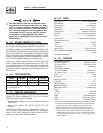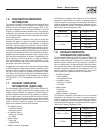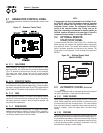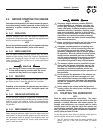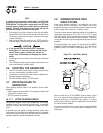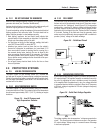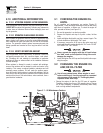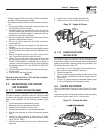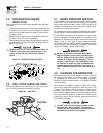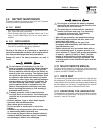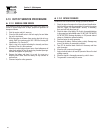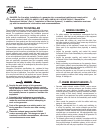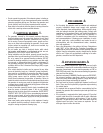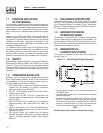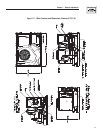
14
3.5 CHECKING THE ENGINE
SPARK PLUG
Clean the spark plug and reset the spark plug gap every 100 hours
of operation.
1. Clean the area around the base of the spark plug to keep dirt
and debris out of the engine. Clean by scraping or washing
using a wire brush and commercial solvent. Do not blast the
spark plug to clean.
2. Remove the spark plug and check the condition. Replace the
spark plug if worn or if reuse is questionable.
3. Check the spark plug gap using a wire feeler gauge. Adjust the
gap to 0.030 inch (0.76 mm) by carefully bending the ground
electrode (Figure 3.4).
Sparking can occur if the wire terminal does not
fit firmly on the spark plug terminal end. If nec-
essary, re-form the wire terminal to obtain a
tight fit.
Figure 3.4 – Setting the Spark Plug Gap
3.6 FUEL FILTER (GASOLINE ONLY)
Remove and replace the fuel filter (Figure 3.5) once each year or
every 100 hours of operation, whichever comes first.
Figure 3.5 – Fuel Filter
Fuel Filter
3.7 SPARK ARRESTOR MUFFLER
If the generator is not equipped with a spark arrestor exhaust
muffler and is to be used on any forest covered, brush covered or
grass covered unimproved land, a spark arrestor may need to be
installed. The spark arrestor must be maintained in effective work-
ing order by the vehicle owner/operator.
For assistance in ordering, installing and maintaining spark arrestor
exhaust mufflers, contact the nearest Authorized Service Dealer.
Exhaust mufflers supplied by the manufacturer are spark arrestor
types. The manufacturer's exhaust mufflers for recreational vehicle
generators do not have a spark arrestor screen, but are of the more
efficient “toroid” or “swirl” type. To remove carbon and combus-
tion deposits from such mufflers, remove the plug from the muffler
and run the engine for approximately 15 minutes. Shut down the
engine, let the muffler cool and install the plug.
Be sure to reinstall the muffler plug tightly.
Engine vibration could cause a loose plug to
fall out. Without the plug in place, hot engine
exhaust is directed out the opening. This hot
exhaust, depending on the installation, could
be directed to areas not able to withstand the
extreme heat such as wooden floor boards or
other flammable material. This could result in a
fire.
3.8 CLEANING THE GENERATOR
Keep the generator set as clean and dry as possible. Protect the
unit against excessive dust, dirt, corrosive vapors, road splash,
etc. Permitting dirt and moisture to accumulate on generator
windings will have an adverse effect on the insulation resistance
of those windings.
When moisture is allowed to remain in contact with windings,
some of the moisture will be retained in voids and cracks in the
insulation. This causes a reduced insulation resistance and will
eventually cause problems. Dirt will make the problem worse,
since dirt tends to hold moisture in contact with windings. Salt (as
from sea air) also will worsen the problem since it tends to absorb
moisture from the air. Salt and moisture, when combined, form a
good electrical conductor.
Do NOT use a forceful spray of water to clean
the generator. Water will enter the generator
interior and cause problems, and may also con-
taminate the generator fuel system.
Section 3 – Maintenance
Recreational Vehicle Generator



